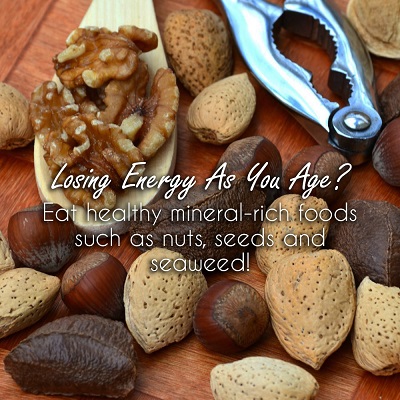 Many of us find ourselves losing energy as the years go by. A part of this is that we are having to eat less to maintain our body weight, and able to exercise less due to health complaints.
Many of us find ourselves losing energy as the years go by. A part of this is that we are having to eat less to maintain our body weight, and able to exercise less due to health complaints.
But, a lot of this energy loss is actually down to completely preventable mineral deficiencies.
It is not uncommon to develop a mineral deficiency as we grow older, because our bodies, diets, and lifestyles change so radically.
It is hard to eat all the minerals you need when your calorie requirements are ridiculously low and when so many minerals are dense in high calorie foods.
And, we are more prone to losing minerals, so we actually need to eat even more than before, not less. So many of us will at some point become deficient in one or more minerals. And, believe it or not, this deficiency could be the root cause of your sudden energy crash.
Iron
Iron is an essential mineral which is used to make hemoglobin. Hemoglobin sits in our red blood cells, carrying oxygen to every cell in the body. And without oxygen in our cells, we have no energy.
When our iron levels drop too low, this is called anemia, and in this state we cannot carry enough oxygen to our various bodily tissues, making us feel tired and low in energy even if we haven’t done anything all day.
Iron can be found in both animal and plant sources, but animal sources are the fastest and simplest ones for our bodies to use. Other than feeling tired, if you are deficient you will notice your skin is getting paler, you will suffer headaches, you may experience constipation, and you may notice inflammation and ulcers in your mouth.
Be aware, however, that excessively high iron can also make you feel tired, so if in doubt, get your blood iron levels checked.
To make sure your iron levels are high enough, make a point of eating iron-rich foods, such as lentils, liver, red meats, etc. If you are not sure you can eat all the iron you need, consider a supplement.
There are dissoluble supplements, but there are also supplements in the form of iron items you can put in a pot of food as it cooks to encourage iron into your meal. But to ensure you absorb and use your iron, you need to have enough vitamin C.
Vitamin C encourages iron to be released from food and absorbed into your body, so it is vital that you take them together. Combine your iron-rich foods with vitamin C foods, such as citrus fruits, berries, or leafy greens. Or take a vitamin C supplement alongside your iron supplement.
Finally, if you continue to show signs of anemia, talk to your doctor about potential illnesses which may be causing bleeding, blood cell death, or a low number of red blood cells.
Magnesium
Magnesium is a mineral that is vital to producing ATP, our bodies’ main energy source. If we do not have enough magnesium, we cannot turn glucose or ketones into ATP, so our energy levels will crash, leaving us feeling exhausted.
It has been found that almost every person with chronic fatigue syndrome, depression, and other exhaustion illnesses have serious magnesium deficiencies, and that giving them magnesium will significantly improve their energy levels.
Most people in developed nations today are at least slightly deficient in magnesium, and it is the only deficiency which is common in both developed and developing countries. Besides feeling tired, you may find a magnesium deficiency can cause you to be irritable, suffer muscle cramps, an irregular heartbeat, high blood pressure, and difficulties sleeping.
When choosing magnesium rich foods, look to nuts, seeds, and seaweed. These foods are the highest in magnesium per hundred grams. Bear in mind that nuts and seeds have phytic acid in them, which stops us from being able to digest them well enough to get the magnesium.
Soak nuts and seeds in water for twelve hours before use to make sure the magnesium is released. You can also consider a strong daily magnesium supplement to boost your levels if you are not sure you can eat enough. Make a point of avoiding foods which deplete your magnesium levels, such as refined carbohydrates, grains and pulses, and coffee and tea.
Also, bear in mind that a deficiency in vitamin B1, vitamin B6, Vitamin D3, Vitamin E, or selenium can cause or worsen a magnesium deficiency, so if in doubt, get full blood works done to detect possible deficiencies.






